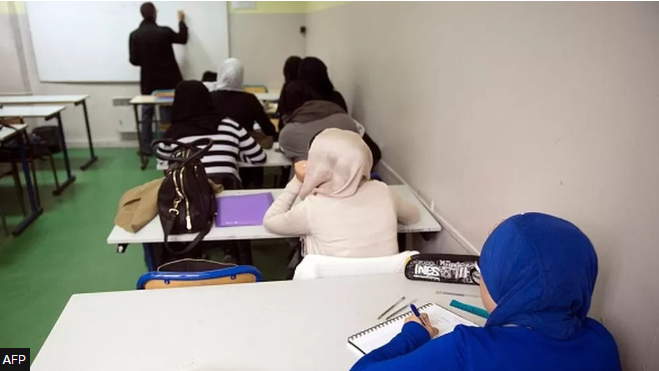The French education minister has said that nearly 300 pupils arrived at school on Monday wearing the abaya, the long Muslim robe which was banned in schools last week.
Most of the girls agreed to change into other clothes.
According to official figures, 298 girls - mainly aged 15 or more - turned up at school in the banned garment.
Under instructions laid down by the ministry, there followed in each case a period of dialogue with school staff.
Most girls then agreed to dress differently and were able to start classes.
However, 67 girls refused to comply and were sent home.
A further period of dialogue with their families will now ensue. If that fails, they will be excluded.
Set against the 12 million school boys and girls who started term on Monday, the government believes the figures show that its ban has been broadly accepted.
However, a legal challenge by a group representing some Muslims goes before the courts later today.
At the end of August, the education minister announced that pupils would be banned from wearing the loose-fitting full-length robes worn by some Muslim women in France's state-run schools at the start of the new school year on 4 September.
France has a strict ban on religious signs in state schools and government buildings, arguing that they violate secular laws.
Wearing a headscarf has been banned since 2004 in state-run schools.
The move comes after months of debate over the wearing of abayas in French schools.
The garment is being increasingly worn in schools, leading to a political divide over them, with right-wing parties pushing for a ban while those on the left have voiced concerns for the rights of Muslim women and girls.
In 2010, France banned the wearing of full-face veils in public, provoking anger in France's five million-strong Muslim community.
France has enforced a strict ban on religious signs at schools since the 19th Century, including Christian symbols such as large crosses, in an effort to curb any Catholic influence on public education.
Reflecting its changing population, it has updated the law over the years to include the Muslim headscarf and Jewish kippa, but abayas have not been banned outright until now.
Latest Stories
-
Two suspects arrested in Elmina for smuggling 250 bags of cocoa beans
16 minutes -
Abuakwa South MP launches 4th edition of BECE support programme
25 minutes -
Lives of Staff and students of GLISS threatened by ECOMOG slum dwellers over impending demolition
30 minutes -
Ouattara slams Hearts fans over lack of support, urges loyalty to local clubs
35 minutes -
Minority slams government over poor handling of nurses’ strike
35 minutes -
EGL launches “Cedi Apicki Apicki” Promo to cushion consumers amid cedi appreciation
36 minutes -
Photos: Interesting images for funeral of late Mamponghene Daasebre Osei Bonsu II
38 minutes -
Bibiani GoldStars CEO confirms Frimpong Manso will stay after historic title win
49 minutes -
Ghana Internet Governance Forum 2025 promotes inclusive digital future
56 minutes -
Drivers with unapproved tinted windows to pay fine as DVLA begins full enforcement of new road worthy penalties
57 minutes -
Deploying retired nurses and midwives won’t solve ongoing strike – GRNMA General Secretary
1 hour -
Sinapi Aba Mentorship Program hosts participants at regional network conference for sustainable business connections
1 hour -
The illusion of control: The data we give and the control we lose
1 hour -
Borders, boots and national pride: The World Cup as a mirror of global politics
1 hour -
‘Our demands are not above the roof’ – Striking nurses and midwives
1 hour

